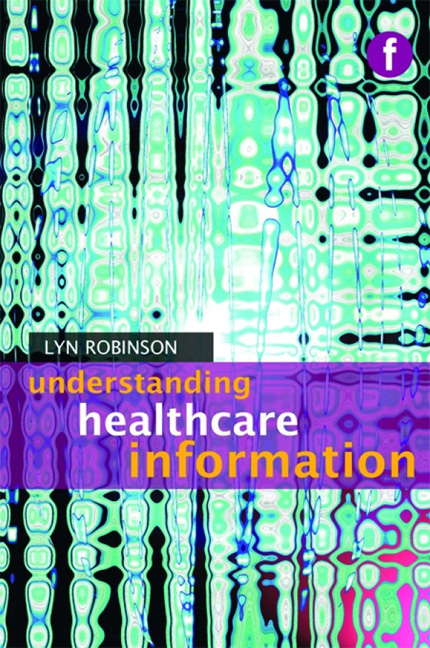Book contents
- Frontmatter
- Contents
- Acronyms and abbreviations
- Introduction
- 1 The healthcare information domain
- 2 History of healthcare and its information environment
- 3 Producers and users of healthcare information
- 4 Healthcare information organization
- 5 Healthcare information sources, services and retrieval
- 6 Healthcare Information and knowledge management
- Afterword
- Index
3 - Producers and users of healthcare information
Published online by Cambridge University Press: 09 June 2018
- Frontmatter
- Contents
- Acronyms and abbreviations
- Introduction
- 1 The healthcare information domain
- 2 History of healthcare and its information environment
- 3 Producers and users of healthcare information
- 4 Healthcare information organization
- 5 Healthcare information sources, services and retrieval
- 6 Healthcare Information and knowledge management
- Afterword
- Index
Summary
Introduction
Studies of the production and use of information are important aspects of domain analysis, and they have always had particular significance in the healthcare area; for example, this has always been one of the most popular areas for the study of information use and users. Such studies have a very clear practical importance for information providers in the area: if you do not know who your users are, what their needs are, or how well they are provided for, it will be very difficult to provide an adequate service.
This importance has increased since around 1980 because changes in the information environment, promoted by the drivers for change noted in Chapter 1, have changed the nature of information production and use. In particular, there is now a wider range of both producers and users of healthcare information, and a greater diversity of means for communication between them. This makes it all the more important to have a good understanding of the changing roles of information producers and users in the new environment.
Producers of healthcare information
We noted in Chapter 1 that the ‘traditional’ producers of healthcare information, namely:
• scientific and clinical researchers, in academia, government institutes, health services, scientific industry, and international organizations
• health professionals (mainly doctors and mainly senior)
• managers, administrators and regulators in government and health services, and in international organizations
• providers of medicines, equipment and healthcare products
• medical journalists and commentators
had been joined by a variety of newer ‘voices’, particularly:
• a wider range of healthcare professionals
• providers of ‘well-being’ products and services
• patients, carers and recipients of healthcare, both as individuals and groups.
This reflects a generally more rich and complex environment for information production. In the ‘traditional’ situation, dominated as noted in Chapter 1 by a relatively small range of types of printed documents, producers and users were closely matched. Researchers wrote primarily for other researchers, and to a limited extent for clinical professionals. Clinicians, mainly doctors and nurses, wrote largely for each other, and to a very limited extent for patients and carers.
- Type
- Chapter
- Information
- Understanding Healthcare Information , pp. 71 - 94Publisher: FacetPrint publication year: 2010



